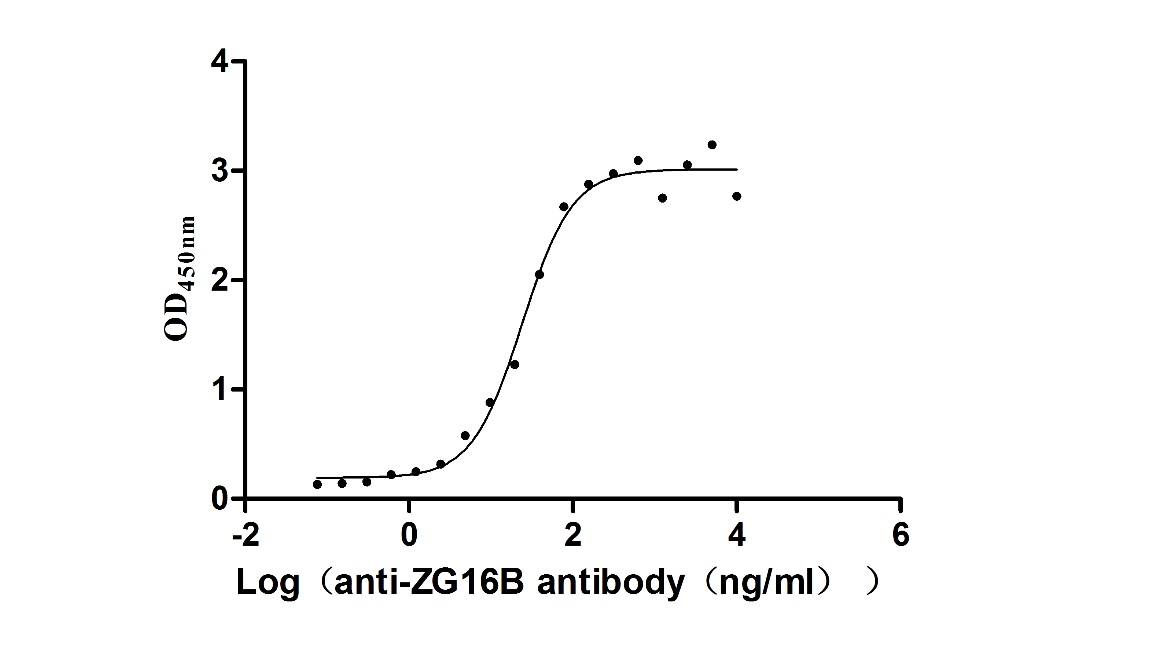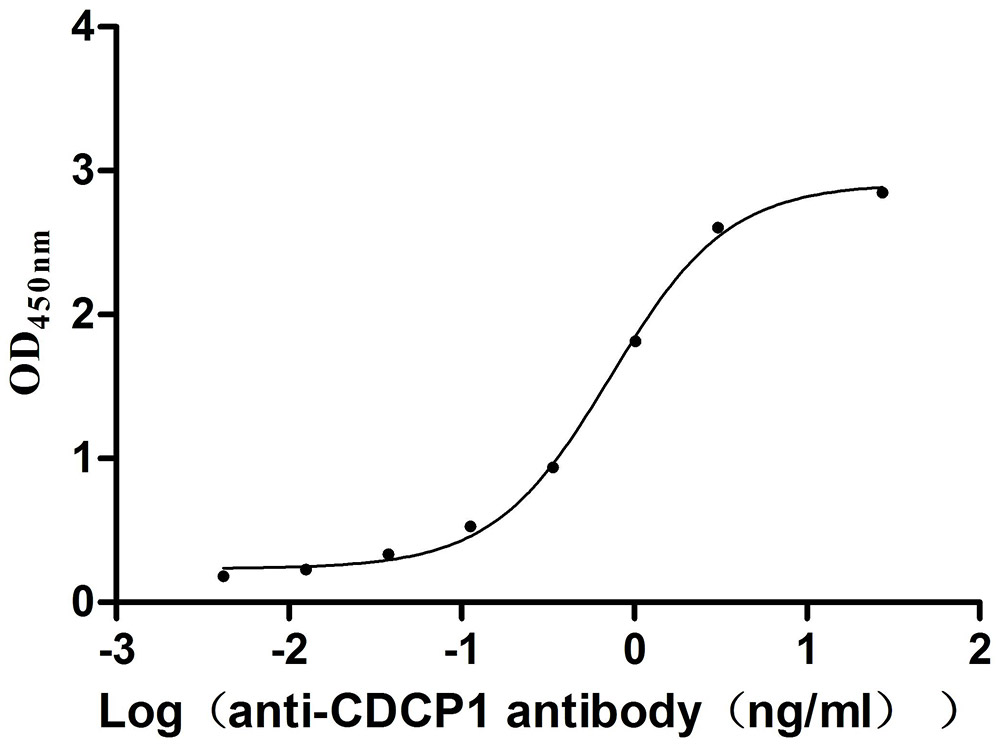Recombinant Human Alpha-aminoadipic semialdehyde dehydrogenase (ALDH7A1)
-
中文名称:Recombinant Human Alpha-aminoadipic semialdehyde dehydrogenase(ALDH7A1),Yeast
-
货号:CSB-YP001579HU
-
规格:
-
来源:Yeast
-
其他:
-
中文名称:Recombinant Human Alpha-aminoadipic semialdehyde dehydrogenase(ALDH7A1),Yeast
-
货号:CSB-EP001579HU
-
规格:
-
来源:E.coli
-
其他:
-
中文名称:Recombinant Human Alpha-aminoadipic semialdehyde dehydrogenase(ALDH7A1),Yeast
-
货号:CSB-EP001579HU-B
-
规格:
-
来源:E.coli
-
共轭:Avi-tag Biotinylated
E. coli biotin ligase (BirA) is highly specific in covalently attaching biotin to the 15 amino acid AviTag peptide. This recombinant protein was biotinylated in vivo by AviTag-BirA technology, which method is BriA catalyzes amide linkage between the biotin and the specific lysine of the AviTag.
-
其他:
-
中文名称:Recombinant Human Alpha-aminoadipic semialdehyde dehydrogenase(ALDH7A1),Yeast
-
货号:CSB-BP001579HU
-
规格:
-
来源:Baculovirus
-
其他:
-
中文名称:Recombinant Human Alpha-aminoadipic semialdehyde dehydrogenase(ALDH7A1),Yeast
-
货号:CSB-MP001579HU
-
规格:
-
来源:Mammalian cell
-
其他:
产品详情
-
纯度:>85% (SDS-PAGE)
-
基因名:ALDH7A1
-
Uniprot No.:
-
别名:26g turgor protein homolog; AL7A1_HUMAN; Aldehyde dehydrogenase 7 A1; Aldehyde dehydrogenase 7 family, member A1; Aldehyde dehydrogenase family 7 member A1; ALDH7A1; Alpha AASA dehydrogenase; Alpha aminoadipic semialdehyde dehydrogenase; Alpha-AASA dehydrogenase; Alpha-aminoadipic semialdehyde dehydrogenase; Antiquitin 1; Antiquitin; Antiquitin-1; ATQ1; Betaine aldehyde dehydrogenase; Delta1 piperideine 6 carboxylate dehydrogenease; Delta1-piperideine-6-carboxylate dehydrogenase; EPD; P6c dehydrogenase; PDE
-
种属:Homo sapiens (Human)
-
蛋白长度:Full Length of Mature Protein
-
表达区域:27-539
-
氨基酸序列AFMS TLLINQPQYA WLKELGLREE NEGVYNGSWG GRGEVITTYC PANNEPIARV RQASVADYEE TVKKAREAWK IWADIPAPKR GEIVRQIGDA LREKIQVLGS LVSLEMGKIL VEGVGEVQEY VDICDYAVGL SRMIGGPILP SERSGHALIE QWNPVGLVGI ITAFNFPVAV YGWNNAIAMI CGNVCLWKGA PTTSLISVAV TKIIAKVLED NKLPGAICSL TCGGADIGTA MAKDERVNLL SFTGSTQVGK QVGLMVQERF GRSLLELGGN NAIIAFEDAD LSLVVPSALF AAVGTAGQRC TTARRLFIHE SIHDEVVNRL KKAYAQIRVG NPWDPNVLYG PLHTKQAVSM FLGAVEEAKK EGGTVVYGGK VMDRPGNYVE PTIVTGLGHD ASIAHTETFA PILYVFKFKN EEEVFAWNNE VKQGLSSSIF TKDLGRIFRW LGPKGSDCGI VNVNIPTSGA EIGGAFGGEK HTGGGRESGS DAWKQYMRRS TCTINYSKDL PLAQGIKFQ
-
蛋白标签:Tag type will be determined during the manufacturing process.
The tag type will be determined during production process. If you have specified tag type, please tell us and we will develop the specified tag preferentially. -
产品提供形式:Lyophilized powder
Note: We will preferentially ship the format that we have in stock, however, if you have any special requirement for the format, please remark your requirement when placing the order, we will prepare according to your demand. -
复溶:We recommend that this vial be briefly centrifuged prior to opening to bring the contents to the bottom. Please reconstitute protein in deionized sterile water to a concentration of 0.1-1.0 mg/mL.We recommend to add 5-50% of glycerol (final concentration) and aliquot for long-term storage at -20℃/-80℃. Our default final concentration of glycerol is 50%. Customers could use it as reference.
-
储存条件:Store at -20°C/-80°C upon receipt, aliquoting is necessary for mutiple use. Avoid repeated freeze-thaw cycles.
-
保质期:The shelf life is related to many factors, storage state, buffer ingredients, storage temperature and the stability of the protein itself.
Generally, the shelf life of liquid form is 6 months at -20°C/-80°C. The shelf life of lyophilized form is 12 months at -20°C/-80°C. -
货期:Delivery time may differ from different purchasing way or location, please kindly consult your local distributors for specific delivery time.Note: All of our proteins are default shipped with normal blue ice packs, if you request to ship with dry ice, please communicate with us in advance and extra fees will be charged.
-
注意事项:Repeated freezing and thawing is not recommended. Store working aliquots at 4°C for up to one week.
-
Datasheet :Please contact us to get it.
相关产品
靶点详情
-
功能:Multifunctional enzyme mediating important protective effects. Metabolizes betaine aldehyde to betaine, an important cellular osmolyte and methyl donor. Protects cells from oxidative stress by metabolizing a number of lipid peroxidation-derived aldehydes. Involved in lysine catabolism.
-
基因功能参考文献:
- By using mass spectrometry techniques, we further explored the metabolic effect of aldh7a1 knockout. Impaired lysine degradation with accumulation of PDE biomarkers, B6 deficiency, and low gamma-aminobutyric acid levels were observed in the aldh7a1(-/-) larvae, which may play a significant role in the seizure phenotype and PDE pathogenesis. PMID: 29061647
- Mutations in the ALDH7A1 gene encoding alpha-amino-adipic semialdehyde (alpha-AASA) dehydrogenase (antiquitin) have been identified as the cause of PDE. We report on a novel ALDH7A1 mutation in a Tunisian child with PDE. PMID: 28131559
- Wild-type ALDH7A1 is shown to exist in a dimer-tetramer equilibrium with a dissociation constant of 16 muM. In contrast to the wild-type enzyme, the variants reside in monomer-dimer equilibria and are apparently incapable of forming a tetrameric species, even at high enzyme concentration. PMID: 28087462
- results suggest that the C-terminus of ALDH7A1 is crucial for the maintenance of both the oligomeric state and the catalytic activity. PMID: 29045138
- We present the clinical and molecular genetic findings of two patients with c.1597_1597delG mutations in ALDH7A1 gene. PMID: 27186704
- Direct sequencing of the ALDH7A1 gene revealed one novel (c.297delG, p.Trp99*) and two already reported (c.328C>T, p.Arg110*; c.584A>G, p.Asn195Ser) mutations PMID: 26232297
- This study found five novel mutations of ALDH7A1 gene in pyridoxin dependent epilepsy. PMID: 26555630
- Binding to ALDH7A1 is associated with movement of the C-terminus into the active site which stabilizes the substrate anchor loop. PMID: 26260980
- Using a custom array, study identified heterozygous intragenic deletions in the ALDH7A1 gene in 5 of 6 patients with pyridoxine-dependent epilepsy and positive biomarkers who had only a single mutation identified by conventional sequence analysis PMID: 26224730
- our study indicated that the ALDH7A1 rs13182402 polymorphism was associated with risk of ESCC in Chinese populations. PMID: 25213698
- Clinical diagnosis, treatment, and ALDH7A1 mutations in pyridoxine-dependent epilepsy in three Chinese infants PMID: 24664145
- Antiquitin is expressed within glial cells in the brain and its dysfunction in pyridoxine-dependent epilepsy is associated with neuronal migration abnormalities. PMID: 24122892
- Pyridoxine dependent epilepsy (PDE) is caused by mutations in the ALDH7A1 gene (PDE-ALDH7A1) encoding alpha-aminoadipic semialdehyde dehydrogenase (alpha-AASAD) enzyme in the lysine catabolic pathway PMID: 23683770
- For patients with NSCLC, low ALDH7A1 expression was associated with a decreased incidence of cancer recurrence. PMID: 23647301
- A novel missense mutation c.1364T>C (p.Leu455Pro)was detected in in two unrelated Tunisian families with pyridoxine-dependent epilepsy. PMID: 23054014
- molecular analysis of seven Pyridoxine-dependent epilepsy Tunisian patients revealed a common missense c.1364T>C mutation in the ALDH7A1 gene; the conservation of a single genotype within the c.1364T > C mutation suggested that this variation has a single origin PMID: 23376216
- Ongoing diagnostic screening and monitoring revealed that in some individuals with milder ALDH7A1 variants. PMID: 22249334
- The effects of a series of twelve disease-associated ALDH7A1 missense mutations on antiquitin activity, were characterized. PMID: 22784480
- Atypical pyridoxine-dependent epilepsy is due to a pseudoexon in ALDH7A1. PMID: 22305855
- The aldehyde dehydrogenase enzyme 7A1 is functionally involved in prostate cancer bone metastasis. PMID: 21647815
- the structural basis for the substrate specificity PMID: 21185811
- ALDH7A1 mechanistically appears to provide cells protection through multiple pathways PMID: 21338592
- Report the genotypic and phenotypic spectrum of pyridoxine-dependent epilepsy due to mutations in ALDH7A1. PMID: 20814824
- The antiquitin 1 oxidation could result in decreased pyridoxal 5-phosphate availability necessary as a cofactor in transaminations, synthesis of glutathione, and synthesis of GABA and dopamine, two neurotransmitters that play a key role in HD pathology. PMID: 20639122
- KCNQ and AP3S1, but not MAN2A1 or ALDH7A1 have a role in risk of type 2 diabetes in the Chinese Northern Han population PMID: 20512086
- ALDH7A1 is a novel aldehyde dehydrogenase expressed in multiple subcellular compartments that protects against hyperosmotic stress by generating osmolytes and metabolizing toxic aldehydes PMID: 20207735
- A SNP, rs13182402, within the ALDH7A1 gene was strongly associated with osteoporosis. PMID: 20072603
- antiquitin was present not only in the cytosol but also in the mitochondria. PMID: 19885858
- Children with pyridoxine-dependent seizures (PDS) have mutations in the ALDH7A1 gene, which encodes antiquitin; these mutations abolish the activity of antiquitin as a delta1-piperideine-6-carboxylate (P6C)-alpha-aminoadipic semialdehyde dehydrogenase. PMID: 16491085
- allelic and non-allelic heterogeneities of pyridoxine dependent seizures, and cerebrospinal fluid glutamate elevation does not directly correlate with the presence of ALDH7A1 mutations. PMID: 17433748
- report of 2 unrelated patients affected with pyridoxine-dependent seizures as a result of alpha-aminoadipic semialdehyde dehydrogenase deficiency caused by pathogenic ALDH7A1 mutations; 2 of the 3 mutations are novel & result in erroneous splicing PMID: 18717709
- The diagnosis of pyridoxine-dependent seizures was confirmed with biochemical and molecular testing revealing elevated alpha-AASA excretion and the presence of 2 different mutations in the antiquitin ( ALDH7A1) gene. PMID: 18854520
- From this study suggested that defects of ALDH7A1 are almost always the cause of neonatal-onset pyridoxine-dependent seizure and that defects in this gene are also responsible for some but not all later-onset cases. PMID: 19128417
- In this study both patients in epilepsy reported here had increased CSF alpha-AASA, CSF pipecolic acid, and known or likely pathogenic mutations in the ALDH7A1 gene, consistent with alpha-AASA dehydrogenase deficiency. PMID: 19142996
- Molecular analysis of the antiquitin gene revealed a novel missense mutation c.57insA, while the mutation of the other allele remained unidentified so far. PMID: 19294602
显示更多
收起更多
-
相关疾病:Pyridoxine-dependent epilepsy (PDE)
-
亚细胞定位:Cytoplasm, cytosol. Nucleus.; [Isoform 1]: Mitochondrion.
-
蛋白家族:Aldehyde dehydrogenase family
-
组织特异性:Abundant in hepatoma cells and fetal cochlea, ovary, eye, heart, adrenal gland, liver and kidney. Low levels present in adult peripheral blood leukocytes and fetal brain, thymus, spleen, skeletal muscle, lung and tongue.
-
数据库链接:
HGNC: 877
OMIM: 107323
KEGG: hsa:501
STRING: 9606.ENSP00000387123
UniGene: Hs.483239
Most popular with customers
-
Recombinant Human T-cell antigen CD7 (CD7), partial (Active)
Express system: Mammalian cell
Species: Homo sapiens (Human)
-
Recombinant Human Pro-neuregulin-1, membrane-bound isoform (NRG1), partial (Active)
Express system: Mammalian cell
Species: Homo sapiens (Human)
-
Recombinant Macaca fascicularis Claudin (CLDN18)-VLPs (Active)
Express system: Mammalian cell
Species: Macaca fascicularis (Crab-eating macaque) (Cynomolgus monkey)
-
Recombinant Human Claudin-4 (CLDN4)-VLPs (Active)
Express system: Mammalian cell
Species: Homo sapiens (Human)
-
Recombinant Macaca fascicularis Trophoblast glycoprotein (TPBG), partial (Active)
Express system: Mammalian cell
Species: Macaca fascicularis (Crab-eating macaque) (Cynomolgus monkey)
-
Recombinant Human Dickkopf-related protein 1 (DKK1) (Active)
Express system: Mammalian cell
Species: Homo sapiens (Human)
-
Recombinant Macaca fascicularis zymogen granule protein 16 homolog B (ZG16B) (Active)
Express system: Mammalian cell
Species: Macaca fascicularis (Crab-eating macaque) (Cynomolgus monkey)
-
Recombinant Mouse CUB domain-containing protein 1 (Cdcp1), partial (Active)
Express system: Mammalian cell
Species: Mus musculus (Mouse)


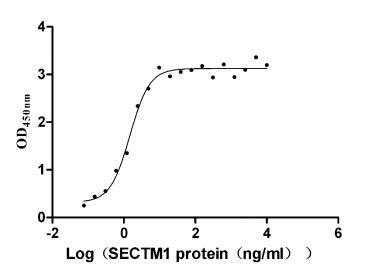
-AC1.jpg)
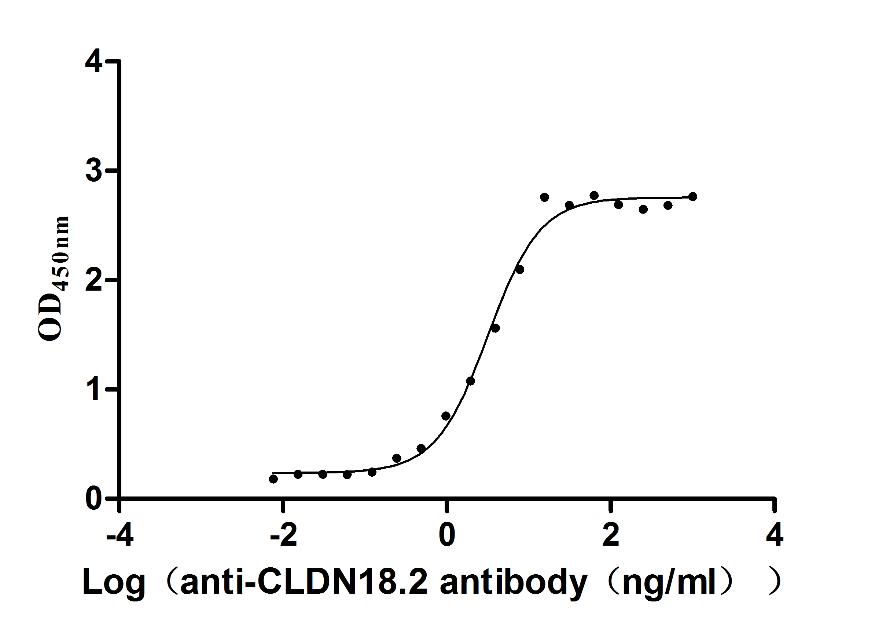
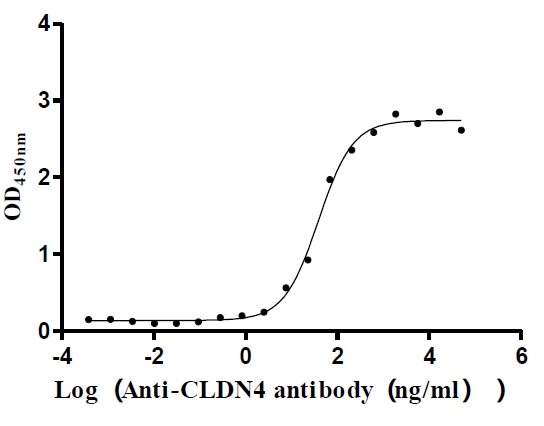
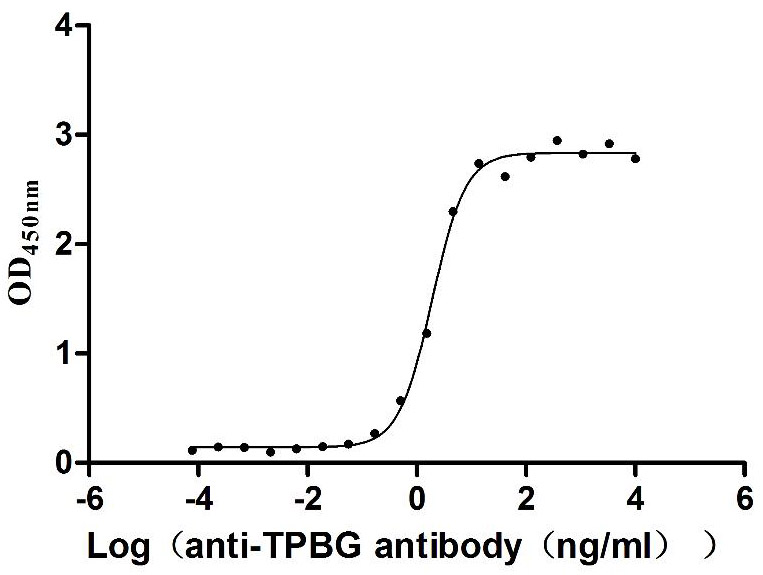
-AC1.jpg)
